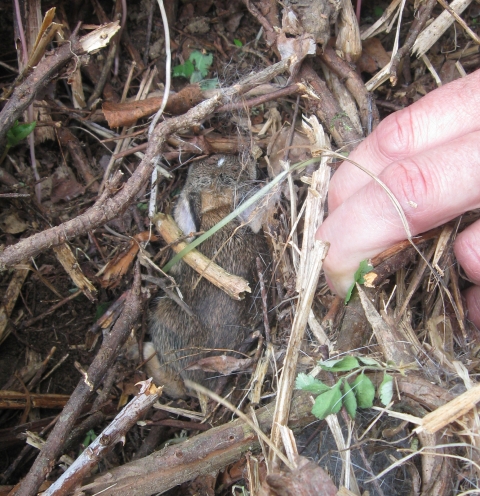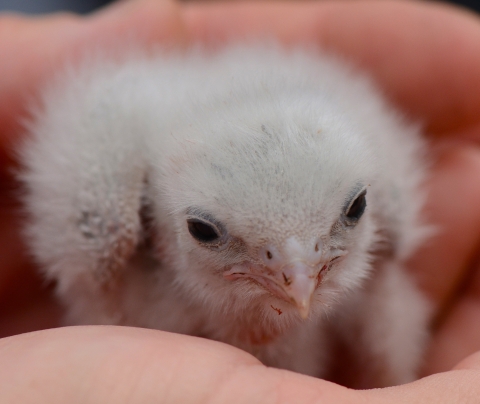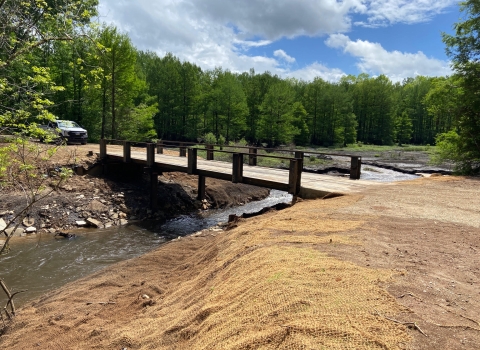All too often refuges get phone calls that start out something like this, “I have found an abandoned baby/hurt animal! What do I need to do with it?” Then sometimes we have to give an answer that’s not what visitors were expecting. Read more to find out what to do should you find wildlife you suspect is injured or abandoned.
In most cases, the most logical answer is to place the animal back where you originally found it. Many times a baby animal is not abandoned, but hiding there from predators while the mom is off feeding.
Baby deer are commonly found in this type of situation in late May or early June. For the first several weeks of their life if they feel threatened, their instinct is to drop to the ground and curl up in a ball and remain very still. The spots help to camouflage them from predators. So, if you do come across a spotted fawn, please do not assume that it has been abandoned, just leave the area quietly without touching it. You can rest assured that mom is not far away and keeping a good eye on the fawn. If the fawn is walking around, constantly crying, and shows signs of dehydration, call a wildlife rehabber.
Eastern cottontails leave their young for long periods of time as well. In fact, some might say they are lousy parents. The mother leaves the young all day only returning at night briefly to feed between dusk and dawn. One way to see if the babies are truly abandoned is to do a flour test. Sprinkle a circle of flower around the nest and check for tracks the next morning. If the nest has been destroyed, maybe by a lawnmower, you can always build a new at that same location. This will not bother the mother and she will still care for her young.
Squirrels often fall out of their nest, but mother squirrels do not abandon their young so easily. If you see the nest is destroyed, again, leave the babies be. The mother will have a second nest built and be soon retrieving the babies. If you are concerned for their safety, such as if there are dogs/cats close, you can place the babies in a basket and hang it in the tree.
Another common phone call is about baby birds on the ground. If the baby bird doesn’t have many feathers and is too small to fly, simply locating the nest and placing the baby back in it, is the very best thing you can do. If the nest is too high or has been destroyed you can hang a grass-lined basket or plastic container (with holes in the bottom) as close to the old nest as you can get. Despite the old saying, “Once you touch a baby bird the mom will smell it and never care for it again.” most birds can’t smell and mom will be very happy to have her baby back.
If the baby bird can fly, maybe just not very good and is mostly hopping, again the best thing for it is to be left alone. This is a fledgling and usually at this point both parents are close by keeping a watch for predators. If you have pets it’s best to keep them away from the area until the baby has flown away. It usually only takes a day or two for baby birds to really get a handle on flying, after all they are birds and that’s what birds do.
If there is a genuine case of an abandoned animal (the mother was seen being taken by a predator, the baby has been observed in the same location for several days with no signs of a parent and the baby looks weak and is not developing properly) or an injured animal, they must go to a licensed rehabber. These are people that have received proper training and certification to handle and care for wildlife. These people do their very best to get the animals healthy in a way that will allow the animal to be returned to the wild. It is recommended to contact the reahabber before moving the animal (if it's not in danger), to receive proper handling instructions.
So all in all yes, animals are cute, but it’s not good for wild animals to be kept as pets for several reasons. First, it is not legal. Depending on what state you live in, either permits are required to possess wildlife or it might not even be allowed at all. Secondly, wild animals are meant to be wild and free. Sometimes, even if animals are given proper care, they become too dependent on people and can never be released.




